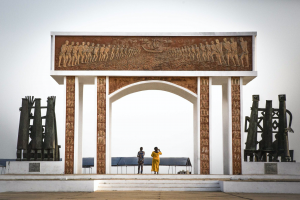A grassroots effort is offering mental-health care to Ukrainians who’ve faced sexual violence at the hands of the Russian invasion force.
In the middle of March, a psychologist named Spartak Subbota was contacted by a group assisting Ukrainian refugees who had recently arrived in Poland. Among them was a young woman in her mid-twenties who had managed to flee a village outside of Chernhiv, in Ukraine’s north, near the border with Belarus—could he speak with her? Russian forces had entered the woman’s village in the early days of the war. Soldiers shot her boyfriend and held her in a basement, where, as she told Subbota, they raped her repeatedly, in the course of several days. “She was in a difficult state,” Subbota told me. “She wasn’t sleeping. Suffering from panic attacks, unconnected from reality.”
Before the war, Subbota, who is thirty, worked with the Ukrainian police to track serial rapists and killers, and he had treated the women who survived these assaults. The woman in Poland told Subbota a story he came to hear many times in the following weeks, as more and more rape survivors were referred to him for psychological counselling. “The soldiers would tell her things like ‘You should know that the Russian Army is strong, so that you remember us and fear us,’ ” Subbota said. “They didn’t mean ‘you’ as an individual—as in you, Tanya or Olya, so to speak—but as a people, a whole nation.” Subbota knew how to treat victims who had been subject to the kind of violence that forces a horrific and cruel intimacy on its survivors, but he was less sure how to care for a person who was violated as an instrument for injuring an entire society. “In such cases, you lose your will and sense of self,” he said, “and regaining them becomes that much harder.”
In early April, the Russian Army pulled out of the Kyiv and Chernihiv regions, revealing evidence of a sustained campaign of terror in places like Bucha and Irpin. Hundreds of women and children who reportedly had been subjected to rape were evacuated from the liberated territories. According to the Times, dozens of rape cases have so far been investigated for possible criminal prosecution. Last month, the first trial against a Russian soldier for rape as a war crime opened in Kyiv; the defendant is accused of breaking into a family’s home in a village outside the capital, killing the father, and raping the mother in front of her child.
The survivors have been offered medical and psychiatric care. At first, Subbota found himself limiting many of his therapy sessions to a half hour. “The simple reason was that I kept running into problems I had never faced before,” he told me. In one case, soldiers tied up a mother and forced her to watch the assault of her daughter. A week into Subbota’s treatment of the twenty-one year-old victim, her mother tried to kill herself. For the first time in his practice, Subbota found himself asking to take pauses so that he could consult with other colleagues who were fielding similar cases. “I wasn’t sure how to continue work so as to not make the condition of the patient even worse,” he said.
Subbota is currently seeing seven patients with wartime traumas, ranging in age from fourteen to thirty; he might only see three of them a day, with sessions stretching on for hours. But creating a safe environment for his clients has been a slow, fitful process. Not long ago, Subbota began therapy with a woman who had been held in a basement with several other women and raped repeatedly, in the course of four days, by a half-dozen Russian soldiers. Even as Subbota’s patient sought treatment for the physical injuries she suffered, she was not able to talk about what she had gone through until the fifteenth session. “We’re not so much deconstructing narratives or working through trauma but asking more elemental questions,” Subbota said. “ ‘What do you associate with a feeling of safety? How would you like me to address you? Are you comfortable?’ ”
Subbota told me of time he spent in recent years with a serial killer from Kryvyi Rih, an industrial center in southern Ukraine, who raped and murdered multiple women. He was a pure sadist, Subbota explained, guided by his own individual impulses. But the stories that Subbota’s patients were telling him suggested an evil that he hadn’t previously encountered. The Russian soldiers tended to rape women in groups, relying on the presence of others to free themselves of responsibility or restraint. “The effect of the crowd, plus the fact that many attackers had their faces covered, created an aura of anonymity, removing any sense of fear or norms, and pushing each person toward maximum barbarity,” he told me.
But even more troubling for Subbota was the sense that Russian soldiers were driven by a desire to punish, to cause harm, and to destroy the population’s will. “They simply wanted to inflict the most pain, to cause the most damage,” Subbota said. “This was not an idea or desire that appeared in the moment and they decided to fulfill in an animalistic way but, rather, a weapon, just like any other, that could be deployed on the battlefield.” He told me his months of treating victims of sexual violence have left their own traumatic imprint on him: “In my consciousness, the world has become a tougher, more violent place.”
As with many aspects of Ukraine’s response to the war—from securing drones and body armor to providing hot meals to volunteer fighters—a grassroots effort quickly took shape to provide mental-health care for those who’ve faced sexual violence at the hands of the Russian invasion force. Across the country, therapists and psychologists set up call centers and impromptu mental-health initiatives. Some retained the trappings of formal organizations, with ties to international organizations and Ukrainian state agencies; others resembled ad-hoc collectives of therapists who shared advice and referred patients to one another.
A Ukrainian psychologist who helped set up a free hotline for victims told me that calls come in waves: “A certain area is liberated, and we get overwhelmed with cases. But then things go quiet, and you think, Thank God, maybe it’s over.” But then Russian forces pull out of villages outside of, say, Kharkiv or Kherson, and therapists know there is a renewed need for their help. “During war, everyone has their own front, and this is ours,” the psychologist said. “We know about trauma and its aftereffects, and that if we don’t help now we’ll only have more problems later, with people harming themselves and one another.”
Nearly all the Ukrainian therapists I spoke to have seen their practices, and their own psyches, transformed by the sheer numbers of those who have faced sexual violence at the hands of Russian troops. Grants pay for some programs, but many mental-health professionals treat rape survivors for free, with hours that are unpredictable and exhausting. Subbota told me of fielding a call at three in the morning to help one of his patients calm down; he stayed on the line until it went quiet and he was sure that she had fallen asleep.
Rape has long been a weapon of war; in the late twentieth century, it was a feature of genocide and ethnic cleansing in the Balkans and Rwanda. Many Ukrainians are familiar with the history of mass rapes committed by the Soviet Red Army at the end of the Second World War, but, as I heard time and again from the psychologists I spoke to, few were prepared—emotionally or logistically—for such wide-scale sexual violence in their own country, even after Russia invaded in February. “I’ve come to see this not as a tactic that’s written down anywhere or passed as direct orders,” Nadiia Volchenska, a thirty-two-year-old psychologist based in Kyiv, who co-founded a network of therapists treating wartime rape victims, said. “But, all the same, a certain logic became clear: if a Russian battalion hunkers down in a particular town or village for two weeks or longer, then we will see cases of rape.”
According to Volchenska, many victims of wartime sexual violence are experiencing overlapping traumas, and their own assault often does not register as the worst or most urgent crisis. Nearly all of her patients have lost their homes. Many have seen relatives killed. There are children to feed and schools and doctors to find while in exile. “When there is so much tragedy all around, people begin to feel shame,” Volchenska said. “That they don’t have it as bad as others. Or they are to blame.” In one case, a patient of Volchenska’s was raped repeatedly by a Russian officer, who came to her apartment for approximately three weeks. He also brought food and medicine, at a time when both were in short supply in town. After the Russian forces withdrew, the woman’s neighbors treated her with resentment. “They told her, ‘You didn’t have it so bad,’ ” Volchenska said.
In a war zone, psychologists themselves are facing difficulties and misfortune. Subbota is from Irpin; he left before Russian forces entered, but his apartment was destroyed. Volchenska fled Ukraine in the days after the invasion and spent several weeks bouncing among temporary housing in Germany before returning to Kyiv in April.
There have been times when she has struggled to control her own feelings during a therapy session. A woman roughly Volchenska’s age had volunteered as a paramedic and an ambulance driver near the front lines, where she was captured by a unit of Russian soldiers. Her assault was so brutal that it left her physically disfigured. For a long time, she and Volchenska only spoke by phone. “She doesn’t want to show her face,” she told me. At one point, out of desperation and exhaustion, the woman said she wished she had never got involved in wartime activism. Volchenska couldn’t hide her own anger and frustration. “I got mad,” Volchenska said. “Why did she have to be so idealistic? Screw this ambulance. If she had left for, say, the Czech Republic, she never would have had to face this pain.”
The exchange only deepened their relationship. “She saw me as genuine,” Volchenska said. “I then told her that I knew why the decision to help was so important for her, and I respected it, even if it pained me.” These days, Volchenska told me, the woman has returned to the front, where she is once again volunteering as a combat medic.
In early April, Natalia Stetsenko, who lives with her husband and nine-year-old daughter in Vyshhorod, a town just outside Kyiv, watched the arrival of a bus from Irpin. A line of women, children, and babushky spilled out, a procession of unprocessed shock and trauma. Stetsenko studied to be a psychologist and social worker, with a focus on teen-agers—for her thesis project, she studied groups of children living on the streets in Kyiv—but she had spent the previous decade working as a corporate manager. Now, in the crowd of those getting off the bus, she noticed a teen-age girl. “She had a calm, almost detached look on her face,” Stetsenko remembered, “and these adult eyes that looked through everyone.” Stetsenko went up to the girl’s mother and led her away from the crowd. “I want to ask you an uncomfortable question,” she said. “Did your daughter face sexual violence?” The mother responded with a look of muted fear, and said, “How did you know?”
As Stetsenko came to learn, the girl, who is fourteen, was at home with her mother and aunt when three armed Russian soldiers burst in. They led her to another room and told the other two women to sit quietly if they wanted to survive. The girl told Stetsenko that, during the assault, the soldiers had said, “We are doing this not to punish you but your nation of fascists.” They were explicit about their intent: they wanted to injure her to the point that she would never want to have children. After they were done, the soldiers gathered up the family’s valuables—jewelry, a laptop, silverware—in a pillowcase and carried them out of the house.
Stetsenko found herself in the role of accidental therapist, drawing on her training from years ago. With the family settled in Vyshhorod, Stetsenko looked for pretexts to stop by and visit, bringing T-shirts for the girl or a box of eclairs. Out of a protective impulse, the girl’s mother had decided to keep the story of her daughter’s ordeal private and not seek outside help. “My most complicated relationship was with the mom,” Stetsenko said. “I was sure at any moment she’d tell me to get lost, that they would deal with it themselves.”
Stetsenko invited the girl on walks around town, never directly raising the subject of her assault. One day, she asked, “How do you imagine you’ll live with this?” The girl answered, “I will get past it. Time heals everything.” The girl also said she felt guilty. “She was certain she did something incorrectly,” Stetsenko said, “that she was at fault for them noticing her, as if she somehow led them to her house that day.” The fact that the girl was willing to talk made Stetsenko feel like she had an opening. She made an appointment for the girl to see a doctor and set up both the girl and her mother with their own professional psychologists.
Two weeks later, Stetsenko got a call from a friend in Kyiv, who told her that another girl, age fifteen, had also arrived from Irpin. Russian soldiers had forcibly entered her family’s home and lived there for five days. During that time, they tied her to a bed and raped her repeatedly. After the girl and her family were evacuated, she realized she was pregnant. When Stetsenko began her first conversations with the girl, they spoke less about her trauma than what had happened to her boyfriend from Irpin—he had disappeared during the town’s occupation, and no one had any news or idea where he ended up, or if he was even alive.
Stetsenko tried to support the girl through a fraught period: doctors advised her to wait some weeks to terminate the pregnancy, to give her time to recover from the physical trauma. In the meantime, the girl told Stetsenko, “I understand there is a living person inside of me, and it’s not his or my fault that he ended up there.” The girl’s mom confided to Stetsenko that she often found her daughter staring out the window in silence for hours at a time.
“In a big crowd of people I was able to identify a certain problem, and not simply let it pass,” Stestenko told me. “In peacetime, though, I can’t say I’d be eager to do this again.” Some days, she goes home, pours a large glass of wine, and cries. She can find herself paranoid and controlling with her own daughter. “I want her in my field of vision, to touch her, to hold her, not to part from her,” she said. “It’s as if I’ve come to a terrible understanding about the world, that there isn’t a safe place anywhere, and I find myself telling that to my daughter: something horrible can happen at any moment.” But, she added, “as long as there is a war in Ukraine, I’ll always be ready.” ♦




